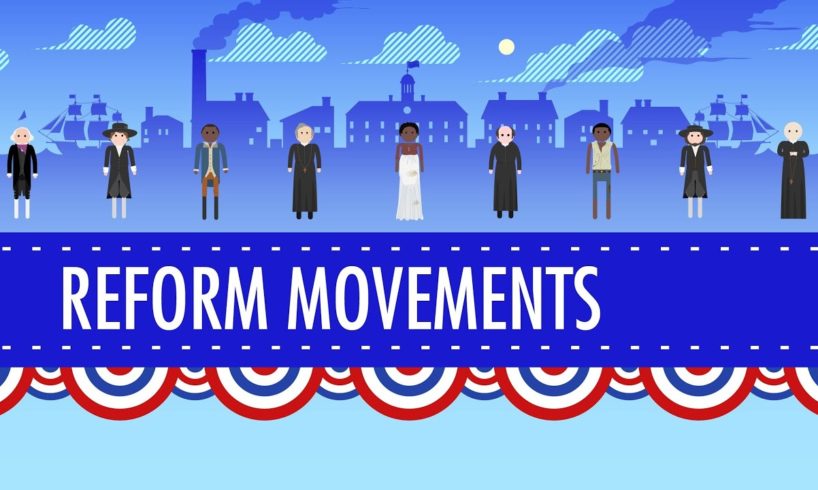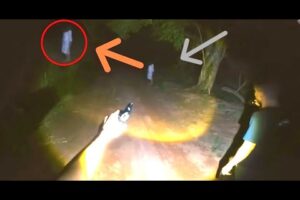
In which John Green teaches you about various reform movements in the 19th century United States. From Utopian societies to the Second Great Awakening to the Abolition movement, American society was undergoing great changes in the first half of the 19th century. Attempts at idealized societies popped up (and universally failed) at Utopia, OH, New Harmony, IN, Modern Times, NY, and many other places around the country. These utopians had a problem with mainstream society, and their answer was to withdraw into their own little worlds. Others didn’t like the society they saw and decided to try to change it. Relatively new Protestant denominations like the Methodists and Baptists reached out to “the unchurched” during the Second Great Awakening, and membership in evangelical sects of Christianity rose quickly. At the same time, Abolitionist societies were trying to free the slaves. Americans of the 19th century had looked at the world they were living in and decided to change it.
Hey teachers and students – Check out CommonLit’s free collection of reading passages and curriculum resources to learn more about the events of this episode.
Of all of the reform movements of the 1800s, few were as impactful as the movement to abolish slavery: https://www.commonlit.org/texts/the-revolutionary-rise-of-abolitionists
Women were heavily involved in the abolitionist movement and firsthand stories like freed slave Harriet Ann Jacobs’ Incidents in the Life of a Slave Girl were important to the cause: https://www.commonlit.org/texts/what-slaves-are-taught-to-think-of-the-north
Learn more about the abolitionist movement in Crash Course Black American History:
Maria Stewart (#14): https://youtu.be/nsVnWD5PrIg
Frederick Douglass (#17): https://youtu.be/7QOTexnD-NE
Chapters:
Introduction: Religious & Moral Reform Movements of the 19th Century 00:00
Shaker Communities 0:33
Latter Day Saints 1:21
Brook Farm 1:46
Other Utopian Communities 2:50
The 2nd Great Awakening 3:21
The Oneida Community 3:44
Values of the 2nd Great Awakening 4:25
The Temperance Movement 5:59
Asylums 7:02
Common Schools 7:29
The Abolitionist Movement 8:13
Resistance to the Abolitionist Movement 10:02
Abolitionist Writers 10:45
Mystery Document 11:40
Frederick Douglass 13:06
Credits 14:14
source







How 'smart' a person is can be very hard to define. I just attempt to be knowledgeable.
wait….if people don't think there was African civilization, what do they think about Egypt?
Great episode. But, I do believe Frederick Douglass gave his speech July 5, 1852.
I loved that Sephiroth made it into the video
pruno…. we don't talk about pruno 🤢🤮
7:05 I'm Batman
Nice video easy to understand the topic, thanks .
all these AP students in the comments stressing over APUSH tests; im with u
I have an essay, discussion post, and exam due today and ive been using crash course videos to study for 2 hours
Why hello there fellow APUSH students, how are you all doing on this fine day?
it’s raining
my grades are failing
How about you?
I'm very disappointed that the attention getter here had to be an extremely loud proclamation about "learning about sex." I use these videos as enrichment for my middle school US History curriculum and to have middle school have to be bombarded with sexual innuendo is ridiculous in what is supposed to an educational video. The rest of the content is engaging enough; the innuendo is not necessary. And no, I am not a prude. I teach these same kids about sex, but do not find shock value to be required.
HE SAID MOB I THOUGHT HE SAID MOM
I was eating and Green mentioned Oneida cutlery, low and behold I turned my fork around….
def not cramming for the ap test… today 2020 wya
good luck with the 2020 AP test everyone!
ap test soon boys
must have sucked to be an apush student in 2013 bc these were not all up by their test date
DBQ in less than 12 hoursssss
I should’ve studied for the AP exam earlier 😂 exam in a few hours
My online AP test is tomorrow. Welcome to the future guys!
Me: Cramming for the AP Exam Tomorrow
John Green: I got a 3!
Me: no, Oh no, i'm screwed.
is that even a real shock pen?????????????????????????????????????
Abolitionism existed in athens in the democracy of ancient greece. Abolitionism was supported above of all by sophists.
Thanks for the tip! Now when I study I take out my mother's car battery and hook it up to my arm! With a little bit of engineering I was able to get it to flip on and off instead of when I put it on it would just shock immediately! Now I am going to study! See you in the next video ^^
Fun fact, the dude to kill president Garfield came from that sex/religious cult and he left because no one would do the nasty with him
What is Benedict Cumberbatch doing on your chalkboard?
Does anyone else pause it at 0:26, 0:27, 0:29, and 0:30 to read every bubble, or is that just me?
We're all watching because our teacher told us to.
I was watching and I shared it to the TV by accident, but I didn't really care because it was just an educational video and it wouldn't be a problem, but then… yeah.
"SEX"
how y'all feeling about just writing a DBQ this year????
I'm a drunk Irish Catholic and I endorse this message.
What are you looking at?
Am I the only one who's completely lost?
My history teacher is a afraid of you because you know more than him
“And New York remained as the heartland of conservative Christianity to this day.”
As someone who has lived in Western and Upstate NY, can confirm
Ha funny sex
sex
I love how he said the name of my church as the "Latter Day-Saints" and "Mormon" the name of my church is "The Church of Jesus Christ of Latter-day Saints". Jesus Christ is the center of our faith.
11:23 Now that's just a cheap shot. At a time when many radio stations would not play records by Black artists, Pat Boone recorded the songs, and the Black artists still got the royalties. It was actually damn good of him for the time.